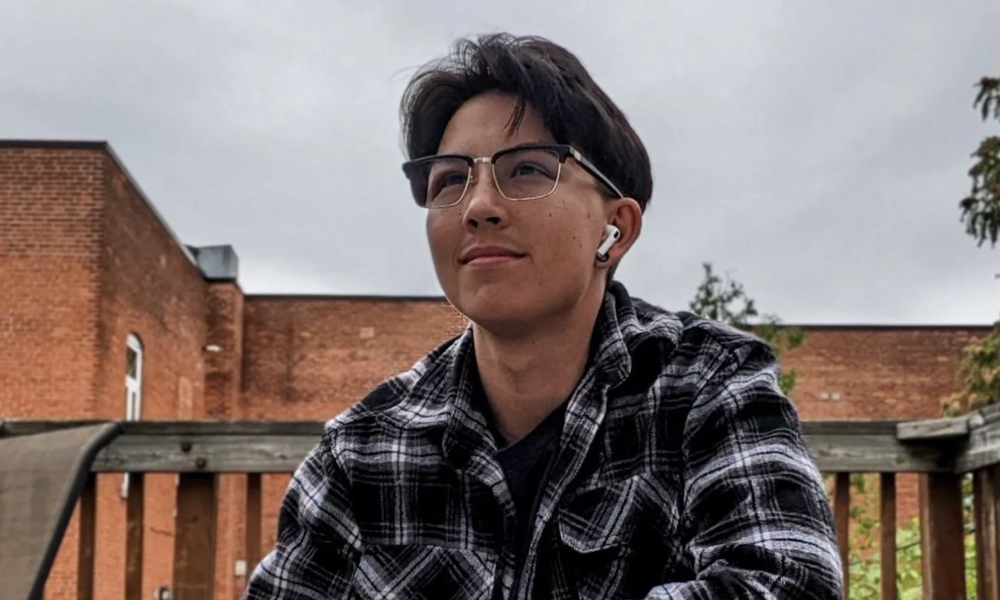Ong already had a clear idea of what he wanted – and who he wanted to make the journey with…
Torin Ong had been denying the fact he was trans for a decade when, in 2020, he started asking his doctor questions about the possibility. “As soon as I could admit to myself that I was trans, I knew immediately my process was going to include medically transitioning top surgery, testosterone, and all that,” says Ong, a 29-year-old bike technician. Born and raised in Scarborough, he has just finished his master’s degree in gender and social justice.
Discovering what “all that” would look like was also part of Ong’s process. He started taking testosterone that year and lived socially as a man while on a wait list for top surgery. When it came to finding a healthcare provider who would guide him through the rest of his transition, Ong already had a clear idea of what he wanted – and who he wanted to make the journey with.
“There was never a doubt in my mind that I wouldn’t go to GraceMed Mississauga,” says Ong, who had his top surgery there in April 2023. “Even before getting the referral from my doctor, I had heard so many good things about them and had met other trans people who had gone to them for top surgery. It just felt like a no-brainer.”
GraceMed, a clinic that provides surgical, dermatological, body-contouring and other non-surgical aesthetic procedures, has several locations across southern Ontario. Its Mississauga location operates the former McLean Clinic, whose founder, Dr. Hugh McLean, pioneered gender-affirming procedures more than 25 years ago. GraceMed Mississauga partnered with the McLean Clinic in 2021, combining forces to provide a wider range of surgical and non-surgical aesthetic services for the trans community. The clinic’s long-standing reputation and commitment to trans patients at all stages of their journeys gave Ong confidence about moving forward with his surgery. But it was also the variety of services the clinic could provide that made GraceMed Mississauga the obvious choice.
“The clinic staff really helped explain the differences between the types of top surgery. They were realistic and super transparent about what would be best for my body type. ‘We can do this, but you might not get the results you want.’ Even though it was very emotional for me, I really appreciated them breaking it down,” says Ong.
After his double mastectomy and the follow-up appointments, Ong returned to GraceMed Mississauga, this time to talk about other procedures that would help masculinize his appearance. At four feet 11 inches tall, half white and half Asian, there were things about Ong that were difficult to change and he was still being misgendered. In queer spaces, he doesn’t live as a male because there’s more freedom to be gender-diverse and go by “they/them.” But everywhere else – on a bus, at Costco, at a mall – Ong lives as a man. Appearance matters.
“The fact that GraceMed Mississauga can and does do so many different procedures that apply to trans people going through their second puberty, and the fact that there are clearly trans people who are part of their team, shows that they really do get it,” says Ong, referring to how transition resembles a kind of “second puberty,” where a person’s body changes dramatically both in major and more subtle ways.
Because facial surgery on his jawbone wasn’t within his budget and he wasn’t sure how it would look on him, the clinic staff recommended alternatives, like dermal filler, that could fill out his jaw, providing a more masculine shape. He went back several times over 10 months as medical experts used filler to shape his jaw.
“I wanted my face to be masculine, but I didn’t even know what that meant. Given my background, facial hair is probably not going to happen for me. I thought if I could get a stronger jawline, that would help,” says Ong. “The medical staff at GraceMed Mississsauga were able to explain it to me in a way that completely made sense. I felt very comfortable and safe – I could trust the people who were shaping my face.”
Dr. Kathleen Armstrong is a surgeon at GraceMed Mississauga, and one of Canada’s experts at gender-affirming surgery; she practises at Women’s College Hospital and teaches at the University of Toronto and Women’s College Hospital, researching surgery outcomes for the trans and gender-diverse community.

“The most important part of the job is just really understanding the specific needs of that patient population and what their goals might be, and how those goals might be different from the cisgender population,” says Armstrong. “For all identities, you should never assume what that person would want. It always has to be an exploratory conversation about goals and objectives, because otherwise you might think to yourself, ‘Oh, a trans man would be more likely to want the surgery and a non-binary person would be more likely to want another option.’ But that’s not always true.”
Armstrong says most trans people who come to GraceMed Mississauga have already done a lot of research about what they want and what surgical and non-surgical aesthetic options are available to them. For example, most trans men have already learned the differences between double incision mastectomy, keyhole and inverted-T top surgery, though GraceMed Mississauga has resources to help people learn more. The initial consultation is usually about listening to their needs and helping them understand what is possible, especially regarding their body type.
GraceMed Mississauga is proud to have recently achieved Rainbow Accreditation that recognizes it as an affirming business committed to the wellness of the 2SLGBTQIA community it serves. “We pride ourselves in helping patients achieve their most authentic self in a welcoming and inclusive environment,” Armstrong adds.
Post surgery, Ong has been more concerned with the shape of his face; others are more concerned with hair and skin. In the case of trans women, that might point them towards laser hair removal. In the case of trans men, it could be dermatological services dealing with acne, which can be triggered by testosterone, or male pattern baldness, though Ong hasn’t had issues there.
“For trans men, there could be jaw-masculinizing procedures, like Torin underwent,” says Armstrong. “For trans women, there’s feminizing lip augmentation, lip-lift procedures and Botox. Those procedures aren’t always necessarily connected to the trans and gender-diverse community, but they are services that GraceMed Mississauaga specializes in, which can be part of the process.”
The Ontario government did not pay for gender-affirming surgery between 1998 and 2008, which made transitioning prohibitively expensive for many trans people. That funding was reinstated 16 years ago, but it still does not cover all gender-affirming services and procedures. However, Armstrong says more and more private insurance plans are covering a wider variety of procedures and services, and there are resources to help find out who covers what.
Having the dermal filler procedure has helped Ong get a better sense of what jawline surgery might do for him – though he still hasn’t decided whether it’s for him. “I can see what I will look like if I were to have the surgery, and so it just felt like a really great place to start.”
Bottom surgery might or might not be in his future. Going through his transition process has helped Ong rethink his own understanding of gender, of what is masculine and feminine. “Because they really are arbitrary associations, rooted in society, transitioning has allowed me to unpack that and see what it really means to me, internally, and not just what it means to the outside world.”
Since working with GraceMed Mississauga, Ong has gained weight, gone back to the gym, and moved up sizes from a boy’s extra-large to a men’s small. “I would say, most of all, my relationship to my body has changed,” he says. “My mind-body connection at the gym, just going swimming without having to wear a sports bra – it’s affirming for me to navigate the world in a way I feel I should have always been able to.”
Ong has been training to take over a bike shop, which is his next big endeavour. Though the focus of his master’s degree was on mental health, intimate-partner violence, and gender-based violence in the queer and trans community, he says fixing bikes isn’t that big of a jump. “So many people come in and they’re getting out of bad relationships or struggling with substance abuse, and riding their bike is what gets them out of that,” he says.
For more information about GraceMed Misssissauga’s surgical and non-surgical aesthetic services, visit https://www.topsurgery.ca







POST A COMMENT